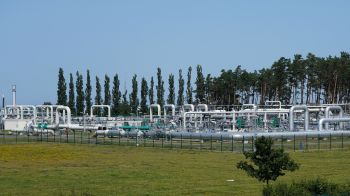Wielding energy for political gain
Share Now on:
Wielding energy for political gain
KAI RYSSDAL: It was a pleasant 72 degrees in Nairobi Kenya today. Three thousand miles to the north, temperatures are dropping fast in Tbilisi, the capital of the former Soviet republic of Georgia. It would be a perfect time to turn on the heat. Except Russia is Georgia’s main supplier of natural gas. And the two countries are arguing over how much Georgia should pay. It’s not the first time Moscow’s played the energy card. Earlier this year, Russia briefly shut down its pipelines into Ukraine. Russia analyst Clifford Kupchan explains the fight’s a little about gas. And a lot about how Russia’s conducting its foreign policy.
CLIFFORD KUPCHAN: Russia has really never reconciled itself to Georgian independence. They look at it sort of as where they go to the beach as part of Russia. And they’re just not willing to let go. So, they’re using a variety of levers, including energy prices, to keep Georgia well within its sphere of influence.
Russia considers itself to be, essentially, an energy superpower. I participated in a meeting with President Putin about six weeks ago when he didn’t like the term “energy superpower” but he said as much: “While we may not be an energy superpower, you have no idea how much power we have.” Well, Russian is indeed resurgent mainly on the basis of what I would call petropower.
RYSSDAL: It’s not just Georgia and the Ukraine that are keeping an eye on this. The Europeans, I read, are very nervous.
KUPCHAN: The Europeans are very nervous because there was a de facto supply cutoff last January when the spat with Ukraine happened. Now, the Russians very much want to acquire downstream assets — distribution systems, transmission systems — in Western Europe. And they’re not really willing to give very much in return. So, a lot of the Europeans are concerned that the Russians want to gain political influence in Western Europe through the EU’s gas dependency on Russian.
RYSSDAL: What’s so special about gas? Why not oil as well?
KUPCHAN: Because the dynamics of gas markets are very, very different. Once you build a fixed gas pipeline, you kinda have a captive customer. In order to get unhooked from Russian gas, whether you’re Georgia or whether you’re Germay, you’ve gotta build another gas line or an LNG plant — it’s very expensive, takes a very long lead time. If somebody cuts you off from oil, you can go to the world market and buy that oil. But there really isn’t a world gas market.
RYSSDAL: What’s going to happen if there can’t be a solution worked out to this?
KUPCHAN: I think the Georgia thing is a spark right now that may turn into a flame. The irony here, in my view, is that in many ways President Putin is playing right into President Saakashvili’s hands. He’s successfully, I think — President Saakashvili — internationalized the conflict to the point where if it really does blow up, Vice President Cheney and President Bush are going to be very much on Georgia’s side.
RYSSDAL: Help me understand how somebody living in the United States is affected by this conflict.
KUPCHAN: One of the reasons we have gotten to the point we are, is that U.S.-Russian relations have plummeted. So that Russia is much more willing to act aggressively in areas like Georgia where it affects U.S. interests. They just don’t really care anymore. And what that means, in turn, is that Russia is not going to be very helpful on Iran. Russia’s going to be less helpful on North Korea. Russia’s not going to be very helpful on U.S. energy security.
RYSSDAL: And all of this because of its tremendous energy wealth.
KUPCHAN: Largely because of its energy wealth. Right now, though, you have 6.5 to 7 percent year-on-year growth in the Russian economy, and that’s not all energy. Russian was flat on its back in 1998. I’d say right now Russia’s just flat back.
RYSSDAL: Cliff Kupchan is director of Europe and Eurasia at the Eurasia Group. That’s a political risk analysis firm. He’s based in Washington, D.C. Mr. Kupchan, thanks for your time.
KUPCHAN: It’s been my pleasure.
There’s a lot happening in the world. Through it all, Marketplace is here for you.
You rely on Marketplace to break down the world’s events and tell you how it affects you in a fact-based, approachable way. We rely on your financial support to keep making that possible.
Your donation today powers the independent journalism that you rely on. For just $5/month, you can help sustain Marketplace so we can keep reporting on the things that matter to you.


















